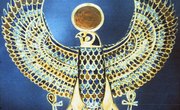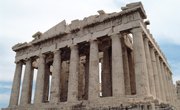Civilization owes a profound debt to the ancient Greeks. The achievements of Ancient Greece still resonate today, showing themselves in the Socratic method, the math we do in algebra class and the ongoing search into the purpose and reason of existence. Apart from great thoughts, however, Ancient Greece also produced great deeds. From athletics to astronomy, the Ancient Greek accomplishments include some of mankind's most distinguished advancements.
Propelling Sports onto the World Scene
Known for their physique and high regard for physical strength, the Ancient Greek accomplishments include a variety of sports that continue to be popular around the world. The Olympics is one of ancient Greece's most famous legacies. They are so popular that the games still take place every four years. First recorded in history in 776 B.C., the games brought together Greeks from different city-states and were an integral part of Greek unity. Centered on feats of strength and masculine prowess, the games were not bound by the rules modern Olympians must follow. Women could not take part, nor were they allowed to watch, on penalty of death. Athletes, who represented themselves rather than their city-states, were initially from the wealthy, aristocratic class; however, as time passed, those who could find sponsors were allowed to compete. Original Greek sports no longer included in today's Olympiad include chariot racing, pankration -- a type of mixed martial arts combat -- and hoplite races.
Medicine, Health and the Hippocratic Oath
The Ancient Greek accomplishments include a sizable contribution to the advancement of medicine. Greek contributions include a number of scientific advancements in medicine. Hippocrates of Cos (450 B.C. - 380 B.C.) was a physician and, with other healers, author of the Corpus Hippocratiumis, which spelled out, for the first time, a methodical way to diagnose and treat patients. Considered the father of medicine, Hippocrates also developed the first code of ethics in any professional field. The Hippocratic Oath continues to be integral to the healing arts today and one of the many Greek contributions that resonate today.
Taking it to the Skies
One of the main achievements of Ancient Greece involved the stars. Stripping away the mystical, the Greeks developed straightforward explanations and philosophies to interpret the natural world. They not only observed the universe; they considered a multitude of possible explanations as to how it functioned, building a representative model to visualize their calculations. Long before Copernicus, mathematician Aristarchus of Samos (310 B.C. - 290 B.C.) questioned the concept of an Earth-centered universe, asserting that the planets instead revolved around the sun. He also grasped the magnitude of the sun, the universe itself and the nature of the stars as other burning suns fixed in space.
Setting the Stage
Greek accomplishments to modern art abound, particularly when it comes to the stage. Early Greek festivals involving singing and acting evolved into theater, one of the era's great accomplishments that can easily traced back to the achievements of ancient Greece. The chorus, a Greek invention, was a substantial part of these early plays and was often accompanied by music. Originally, a Greek chorus was a group of actors on stage who commented on the main points of the play and were an integral part in the arc of the story to drive it forward. Today, chorus is mainly referred to a group of actors who use music and song to propel the story happening onstage. Greek playwrights of the Classical Age are still studied today for the tragic historical and mythological elements explored in their work. Sophocles (495 - 406 B.C.), author of "Oedipus Rex," was the first playwright to use painted scenery onstage and to standardize the number of chorus members. Euripides (480 - 406 B.C.) was a rabble-rouser, producing plays that incited controversy and debate over traditional values. He was also the first to employ the use of inner struggle to motivate his characters. Aristophanes (448 - 338 or 380 B.C.), another accomplished playwright of the time, wrote bawdy comedy, his most famous play being "Lysistrata."
Laws, Leaders and Democracy
Today's democratic governments are founded on the ideology of the Ancient Greeks. Like other city-states, Athens was once ruled by a monarchy; however, after the last tyrant Hippias was overthrown by a strategic coup led by Cleisthenes (570 B.C. - 508 B.C.), civilization was never the same. What followed was the blossoming of Athens into the world's first democratic government; one in which the aristocracy did not hold all the power. Building on the reforms of the Greek sage Solon (630 B.C. - 560 B.C.), who founded Greece's first representative legislative bodies, Cleisthenes instituted a constitution and established the formation of local neighborhood councils to bring the government closer to the people. The ideals of democracy have endured, arguably becoming Greece's greatest accomplishment.
Related Articles
References
Writer Bio
Karen Clark has been writing professionally since 2001. Her work includes articles on gardening, education and literature. Clark has also published short literary fiction in the "Southern Humanities Review" and has co-authored a novel. Her professional experience includes teaching and tutoring students of all ages in literature, history and writing. She holds a Bachelor of the Arts in political science and a Master of Fine Arts in writing.










